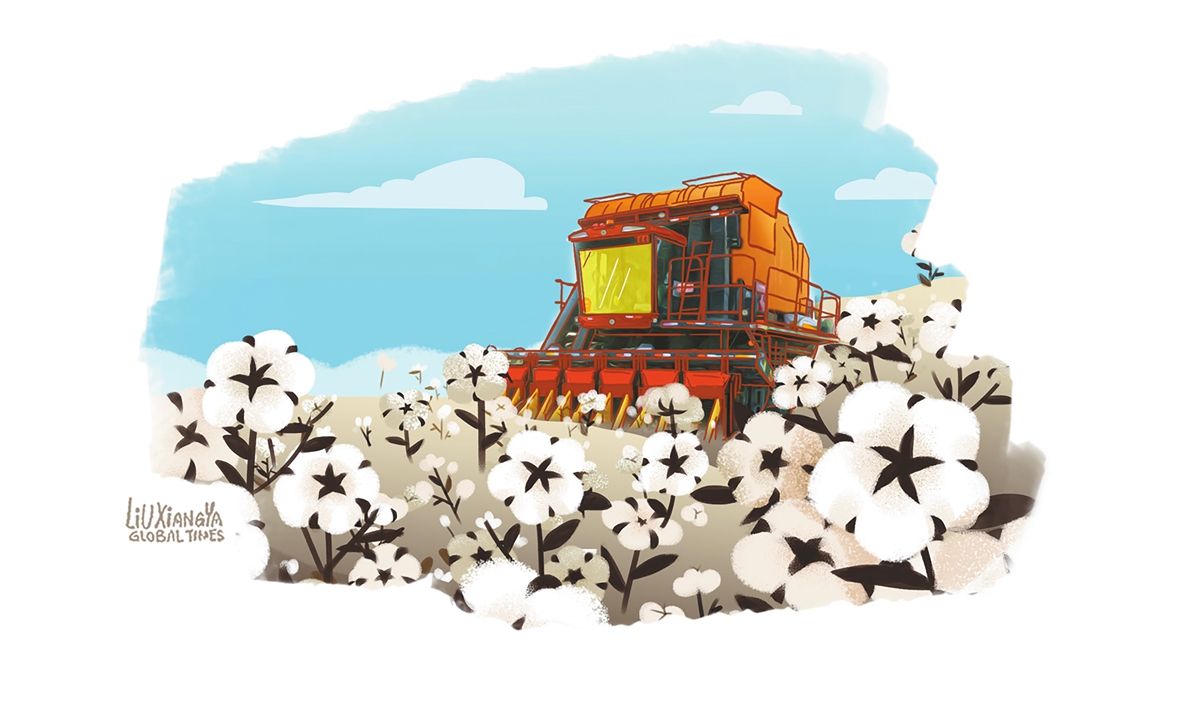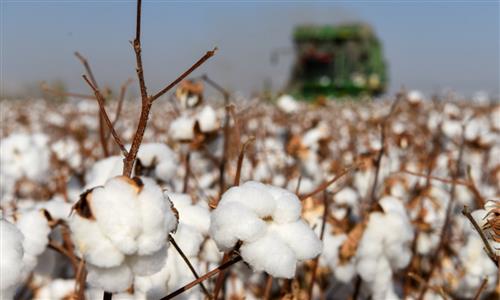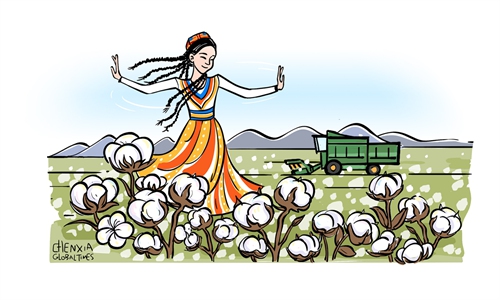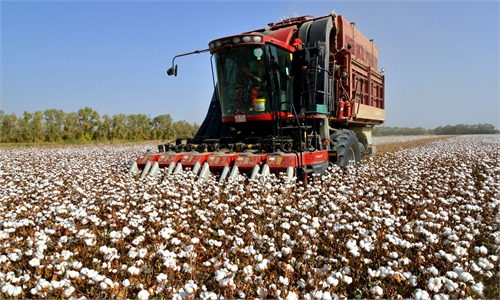Strong cotton output in Xinjiang highlights local resilience amid discriminatory trade

Illustration: Liu Xiangya/GT
Cotton output in Northwest China's Xinjiang Uygur Autonomous Region reached nearly 5.69 million tons in 2024, up 574,000 tons over the previous year, according to the National Bureau of Statistics. The autonomous region contributed 92.2 percent of the country's total cotton output this year, setting a new record, according to the Xinhua News Agency.
The steady growth of high-quality cotton production in Xinjiang highlights the resilience and potential of the local cotton industry, even in the face of discriminatory trade measures imposed by Western nations targeting Xinjiang cotton.
These measures stem from unfounded rumors propagated by some anti-China politicians in the US and other Western countries, which aim to undermine the development of the local industry, destabilize Xinjiang to undermine China's stability and contain China's development.
For years, certain American politicians with anti-China agendas have focused their attacks on Xinjiang. Their motives include a desire for "forced industrial decoupling," promoting unemployment, and suppressing specific Chinese enterprises and industries. To further their agenda, they have launched smear campaigns against the region by fabricating allegations of "forced labor".
The latest example involving the cotton industry in Xinjiang is the US announcement in May that it added 26 Chinese cotton traders or warehouse facilities to the entity list of the so-called "Uyghur Forced Labor Prevention Act" (UFLPA), Reuters reported.
These discriminatory trade practices not only harm the reputation and interests of related industries and enterprises in Xinjiang but also violate the principles of fairness, justice, and mutual benefit in international trade. Such actions tarnish the hard work of farmers and workers in the region, and are aimed at diminishing sales and ultimately harming the local economy and the livelihoods of residents who depend on the cotton industry.
Despite the increasing pressure from Western anti-China forces, the Xinjiang cotton sector has demonstrated remarkable resilience. Through continuous optimization of planting structures, enhanced mechanization, and strengthened technological research and development, the region has maintained stable production growth and achieved improvements in cotton quality. Cotton exports from China experienced a remarkable year-on-year increase of 167.3 percent in the first half of 2024, according to data from China's Commerce Ministry.
Given that Xinjiang cotton accounts for around 90 percent of China's total cotton production, this indicates that Xinjiang cotton exports also experienced significant growth in the first half of this year.
The thriving production of Xinjiang cotton indicates that the smear campaigns and discriminatory trade actions by US anti-China forces will not achieve their scheme of suppressing the development of Xinjiang's cotton industry.
This situation underscores the fact that geopolitical pressure and political interference do not necessarily lead to economic decline for targeted sectors. Instead, the Xinjiang cotton industry continues to flourish, showcasing its ability to withstand external challenges.
Moreover, by imposing unjust restrictions based on unfounded allegations, these actions disrupt the spirit of cooperation essential for fostering healthy trade relationships. Upholding these principles is crucial for promoting a balanced global trading environment.
Most countries and companies that purchase cotton from Xinjiang will recognize the quality of the product and see through the slanders against it. Xinjiang cotton stands out for its quality, and the region possesses the capability and strength to maintain this standard.
Xinjiang's impressive cotton output reflects not only the region's agricultural potential but also its strength in the face of external pressures. The local industry's ability to continue to thrive serves as a testament to the strength and quality of Xinjiang cotton. The future of Xinjiang cotton looks promising, and those who recognize its value will benefit from engaging in fair trade practices.
The author is a reporter with the Global Times. bizopinion@globaltimes.com.cn



